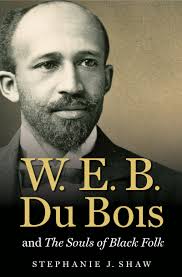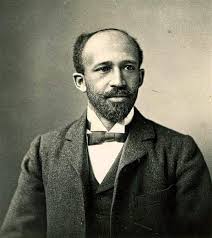The Souls of Black Folk Page #32
The Souls of Black Folk is a 1903 work of American literature by W. E. B. Du Bois. It is a seminal work in the history of sociology and a cornerstone of African-American literature. The book contains several essays on race, some of which the magazine Atlantic Monthly had previously published.
It is easy for us to lose ourselves in details in endeavoring to grasp and comprehend the real condition of a mass of human beings. We often forget that each unit in the mass is a throbbing human soul. Ignorant it may be, and poverty stricken, black and curious in limb and ways and thought; and yet it loves and hates, it toils and tires, it laughs and weeps its bitter tears, and looks in vague and awful longing at the grim horizon of its life,—all this, even as you and I. These black thousands are not in reality lazy; they are improvident and careless; they insist on breaking the monotony of toil with a glimpse at the great town-world on Saturday; they have their loafers and their rascals; but the great mass of them work continuously and faithfully for a return, and under circumstances that would call forth equal voluntary effort from few if any other modern laboring class. Over eighty-eight per cent of them—men, women, and children—are farmers. Indeed, this is almost the only industry. Most of the children get their schooling after the “crops are laid by,” and very few there are that stay in school after the spring work has begun. Child-labor is to be found here in some of its worst phases, as fostering ignorance and stunting physical development. With the grown men of the county there is little variety in work: thirteen hundred are farmers, and two hundred are laborers, teamsters, etc., including twenty-four artisans, ten merchants, twenty-one preachers, and four teachers. This narrowness of life reaches its maximum among the women: thirteen hundred and fifty of these are farm laborers, one hundred are servants and washerwomen, leaving sixty-five housewives, eight teachers, and six seamstresses. Among this people there is no leisure class. We often forget that in the United States over half the youth and adults are not in the world earning incomes, but are making homes, learning of the world, or resting after the heat of the strife. But here ninety-six per cent are toiling; no one with leisure to turn the bare and cheerless cabin into a home, no old folks to sit beside the fire and hand down traditions of the past; little of careless happy childhood and dreaming youth. The dull monotony of daily toil is broken only by the gayety of the thoughtless and the Saturday trip to town. The toil, like all farm toil, is monotonous, and here there are little machinery and few tools to relieve its burdensome drudgery. But with all this, it is work in the pure open air, and this is something in a day when fresh air is scarce. The land on the whole is still fertile, despite long abuse. For nine or ten months in succession the crops will come if asked: garden vegetables in April, grain in May, melons in June and July, hay in August, sweet potatoes in September, and cotton from then to Christmas. And yet on two-thirds of the land there is but one crop, and that leaves the toilers in debt. Why is this? Away down the Baysan road, where the broad flat fields are flanked by great oak forests, is a plantation; many thousands of acres it used to run, here and there, and beyond the great wood. Thirteen hundred human beings here obeyed the call of one,—were his in body, and largely in soul. One of them lives there yet,—a short, stocky man, his dull-brown face seamed and drawn, and his tightly curled hair gray-white. The crops? Just tolerable, he said; just tolerable. Getting on? No—he wasn’t getting on at all. Smith of Albany “furnishes” him, and his rent is eight hundred pounds of cotton. Can’t make anything at that. Why didn’t he buy land! Humph! Takes money to buy land. And he turns away. Free! The most piteous thing amid all the black ruin of war-time, amid the broken fortunes of the masters, the blighted hopes of mothers and maidens, and the fall of an empire,—the most piteous thing amid all this was the black freedman who threw down his hoe because the world called him free. What did such a mockery of freedom mean? Not a cent of money, not an inch of land, not a mouthful of victuals,—not even ownership of the rags on his back. Free! On Saturday, once or twice a month, the old master, before the war, used to dole out bacon and meal to his Negroes. And after the first flush of freedom wore off, and his true helplessness dawned on the freedman, he came back and picked up his hoe, and old master still doled out his bacon and meal. The legal form of service was theoretically far different; in practice, task-work or “cropping” was substituted for daily toil in gangs; and the slave gradually became a metayer, or tenant on shares, in name, but a laborer with indeterminate wages in fact. Still the price of cotton fell, and gradually the landlords deserted their plantations, and the reign of the merchant began. The merchant of the Black Belt is a curious institution,—part banker, part landlord, part banker, and part despot. His store, which used most frequently to stand at the cross-roads and become the centre of a weekly village, has now moved to town; and thither the Negro tenant follows him. The merchant keeps everything,—clothes and shoes, coffee and sugar, pork and meal, canned and dried goods, wagons and ploughs, seed and fertilizer,—and what he has not in stock he can give you an order for at the store across the way. Here, then, comes the tenant, Sam Scott, after he has contracted with some absent landlord’s agent for hiring forty acres of land; he fingers his hat nervously until the merchant finishes his morning chat with Colonel Saunders, and calls out, “Well, Sam, what do you want?” Sam wants him to “furnish” him,—i.e., to advance him food and clothing for the year, and perhaps seed and tools, until his crop is raised and sold. If Sam seems a favorable subject, he and the merchant go to a lawyer, and Sam executes a chattel mortgage on his mule and wagon in return for seed and a week’s rations. As soon as the green cotton-leaves appear above the ground, another mortgage is given on the “crop.” Every Saturday, or at longer intervals, Sam calls upon the merchant for his “rations’; a family of five usually gets about thirty pounds of fat side-pork and a couple of bushels of cornmeal a month. Besides this, clothing and shoes must be furnished; if Sam or his family is sick, there are orders on the druggist and doctor; if the mule wants shoeing, an order on the blacksmith, etc. If Sam is a hard worker and crops promise well, he is often encouraged to buy more,—sugar, extra clothes, perhaps a buggy. But he is seldom encouraged to save. When cotton rose to ten cents last fall, the shrewd merchants of Dougherty County sold a thousand buggies in one season, mostly to black men.
Translation
Translate and read this book in other languages:
Select another language:
- - Select -
- 简体中文 (Chinese - Simplified)
- 繁體中文 (Chinese - Traditional)
- Español (Spanish)
- Esperanto (Esperanto)
- 日本語 (Japanese)
- Português (Portuguese)
- Deutsch (German)
- العربية (Arabic)
- Français (French)
- Русский (Russian)
- ಕನ್ನಡ (Kannada)
- 한국어 (Korean)
- עברית (Hebrew)
- Gaeilge (Irish)
- Українська (Ukrainian)
- اردو (Urdu)
- Magyar (Hungarian)
- मानक हिन्दी (Hindi)
- Indonesia (Indonesian)
- Italiano (Italian)
- தமிழ் (Tamil)
- Türkçe (Turkish)
- తెలుగు (Telugu)
- ภาษาไทย (Thai)
- Tiếng Việt (Vietnamese)
- Čeština (Czech)
- Polski (Polish)
- Bahasa Indonesia (Indonesian)
- Românește (Romanian)
- Nederlands (Dutch)
- Ελληνικά (Greek)
- Latinum (Latin)
- Svenska (Swedish)
- Dansk (Danish)
- Suomi (Finnish)
- فارسی (Persian)
- ייִדיש (Yiddish)
- հայերեն (Armenian)
- Norsk (Norwegian)
- English (English)
Citation
Use the citation below to add this book to your bibliography:
Style:MLAChicagoAPA
"The Souls of Black Folk Books." Literature.com. STANDS4 LLC, 2025. Web. 10 Jan. 2025. <https://www.literature.com/book/the_souls_of_black_folk_310>.




Discuss this The Souls of Black Folk book with the community:
Report Comment
We're doing our best to make sure our content is useful, accurate and safe.
If by any chance you spot an inappropriate comment while navigating through our website please use this form to let us know, and we'll take care of it shortly.
Attachment
You need to be logged in to favorite.
Log In